- Home
- Frederick Marryat
Travels and Adventures of Monsieur Violet Page 2
Travels and Adventures of Monsieur Violet Read online
Page 2
CHAPTER TWO.
I was very young then--not thirteen years old; but if I was young, I hadtravelled much, and had gained that knowledge which is to be obtained bythe eye--perhaps the best education we can have in our earlier years. Ishall pass over the monotony of the voyage of eternal sky and water. Ihave no recollection that we were in any imminent danger at anytime, andthe voyage might have been styled a prosperous one.
After five months, we arrived off the coast, and with some difficulty wegained the entrance of a river falling into Trinity Bay, in latitude 41degrees north and longitude 124 degrees 28 minutes west.
We anchored about four miles above the entrance, which was on the coastabreast of the Shoshones' territory, and resorted to by them on theirannual fishing excursions. In memory of the event, the river was namedby the Indians--"Nu eleje sha wako;" or, the Guide of the Strangers.
For many weeks it was a strange and busy scene. The Prince Seravallehad, during his former residence with the Shoshones, been admitted intotheir tribe as a warrior and a chief, and now the Indians flocked fromthe interior to welcome their pale-faced chief, who had not forgottenhis red children. They helped our party to unload the vessel, providedus with game of all kinds, and, under the directions of the carpenter,they soon built a large warehouse to protect our goods and implementsfrom the effect of the weather.
As soon as our cargo was housed, the Prince and my father, accompaniedby the chiefs and elders of the tribe, set off on an exploring party, toselect a spot fit for the settlement. During their absence, I wasentrusted to the care of one of the chief's squaws, and had threebeautiful children for my playmates. In three weeks the party returned;they had selected a spot upon the western banks of the Buona VenturaRiver, at the foot of a high circular mountain, where rocks, coveredwith indurated lava and calcined sulphur, proved the existence of formervolcanic eruptions. The river was lined with lofty timber; immensequarries of limestone were close at hand, and the minor streams gave usclay, which produced bricks of an excellent quality.
The Spaniards had before visited this spot, and had given the mountainthe name of St. Salvador; but our settlement took the Indian appellationof the Prince, which was--"Nanawa ashta jueri e," or the Dwelling of theGreat Warrior. As the place of our landing was a great resort of theIndians during the fishing season, it was also resolved that a squarefort and store, with a boat-house, should be erected there; and for sixor seven months all was bustle and activity, when an accident occurredwhich threw a damp upon our exertions.
Although the whole country abounds in cattle, and some other tribes, ofwhich I shall hereafter make mention, do possess them in large herds,the Shoshones did not possess any. Indeed, so abundant was the game inthis extensive territory, that they could well dispense with them; butas the Prince's ambition was to introduce agriculture and more domestichabits among the tribe he considered it right that they should beintroduced. He therefore despatched the Esmeralda to obtain them eitherat Monterey or Santa Barbara. But the vessel was never more heard of:the Mexicans stated that they had perceived the wreck of a vessel offCape Mendocino, and it was but natural to suppose that these were theremains of our unfortunate brig.
All hands on board perished, and the loss was very heavy to us. Thecrew consisted of the captain, his son, and twelve men, and there werealso on board five of our household, who had been despatched uponvarious commissions, Giuseppe Polidori, the youngest of ourmissionaries, one of our gunsmiths, one of our masons, and two Italianfarmers. Melancholy as was this loss, it did not abate the exertions ofthose who were left. Fields were immediately cleared--gardens prepared;and by degrees the memory of this sad beginning faded away before theprospect of future happiness and comfort.
As soon as we were completely established, my education commenced. Itwas novel, yet still had much affinity to the plan pursued with thestudents of the Military Colleges in France, inasmuch as all my playhours were employed in the hardier exercises. To the two excellentmissionaries I owe much, and with them I passed many happy hours.
We had brought a very extensive and very well selected library with us,and under their care I soon became acquainted with the arts and sciencesof civilisation: I studied history generally, and they also taught meLatin and Greek, and I was soon master of many of the modern languages.And as my studies were particularly devoted to the history of theancient people of Asia, to enable me to understand their theories andfollow up their favourite researches upon the origin of the great ruinsin Western and Central America, the slight knowledge which I had gainedat the Propaganda of Arabic and Sanscrit was now daily increased.
Such were my studies with the good fathers: the other portion of myeducation was wholly Indian. I was put under the charge of a celebratedold warrior of the tribe, and from him I learned the use of the bow, thetomahawk, and the rifle, to throw the lasso, to manage the wildesthorse, to break in the untamed colt; and occasionally I was permitted toaccompany them in their hunting and fishing excursions.
Thus for more than three years did I continue to acquire knowledge ofvarious kinds, while the colony gradually extended its fields, and thereappeared to be every chance of gradually reclaiming the wild Shoshonesto a more civilised state of existence.
But "l'homme propose et Dieu dispose." Another heavy blow fell upon thePrince, which eventually proved the ruin of all his hopes. After theloss of the vessel, we had but eight white men in the colony, besidesthe missionaries and ourselves; and the Prince, retaining only myfather's old servant, determined upon sending the remainder to purchasethe cattle which we had been so anxious to obtain.
They departed on this mission, but never returned. In all probability,they were murdered by the Apaches Indians, although it is not impossiblethat, tired of our simple and monotonous life, they deserted us toestablish themselves in the distant cities of Mexico.
This second catastrophe weighed heavy upon the mind of the good oldPrince. All his hopes were dashed to the ground--the illusions of thelatter part of his life were destroyed for ever. His proudestexpectations had been to redeem his savage friends from their wild life,and this could only be effected by commerce and agriculture.
The farms round the settlement had for now nearly four years been tilledby the squaws and young Indians, under the direction of the white men,and although the occupation was by no means congenial to their nature,the Prince had every anticipation that, with time and example, theShoshones would perceive the advantages, and be induced to till the landfor themselves.
Before our arrival, the winter was always a season of great privation tothat portion of the Indians who could not repair to the hunting grounds,while now, Indian corn, potatoes, and other vegetables were in plenty,at least for those who dwelt near to the settlement. But now that wehad lost all our white cultivators and mechanics, we soon found that theIndians avoided the labour.
All our endeavours proved useless: the advantages had not yet beensufficiently manifest: the transition attempted had been too short; andthe good, although proud and lazy, Shoshones abandoned the tillage, andrelapsed into their former apathy and indifference.
Mortified at this change, the Prince and my father resolved to make anappeal to the whole nation, and try to convince them how much happierthey would be if they would cultivate the ground for their support. Agreat feast was given, the calumet was smoked; after which the Princerose and addressed them after their own fashion. As I had, a short timeprevious, been admitted as a chief and warrior, I, of course, waspresent at the meeting. The Prince spoke:--
"Do you not want to become the most powerful nation of the West? Youdo. If then such is the case, you must ask assistance from the earth,which is your mother. True, you have prairies abounding in game, butthe squaws and the children cannot follow your path when hunting.
"Are not the Crows, the Bannaxas, the Flat Heads, and the Umbiquas,starving during the winter? They have no buffalo in their land, and butfew deer. What have they to eat? A few lean horses, perchance a bear
;and the stinking flesh of the otter or beaver they may trap during theseason.
"Would they not be too happy to exchange their furs against the corn,the tobacco, and good dried fish of the Shoshones? Now they sell theirfurs to the Yankees, but the Yankees bring them no food. The Flat Headstake the fire-water and blankets from the traders, but they do sobecause they cannot get any thing else, and their packs of furs wouldspoil if they kept them.
"Would they not like better to barter them with you, who are so near tothem, for good food to sustain them and their children during thewinter--to keep alive their squaws and their old men during the longsnow and the dreary moons of darkness and gloom?
"Now if the Shoshones had corn and tobacco to give for furs, they wouldbecome rich. They would have the best saddles from Mexico, and the bestrifles from the Yankees, the best tomahawks and blankets from theCanadians. Who then could resist the Shoshones? When they would gohunting, hundreds of the other natives would clear for them the forestpath, or tear with their hands the grass out of their track in theprairie. I have spoken."
All the Indians acknowledged that the talk was good and full of wisdom;but they were too proud to work. An old chief answered for the wholetribe.
"Nanawa Ashta is a great chief; he is a brave! The Manitou speakssoftly to his ears, and tells him the secret which makes the heart of awarrior big or small; but Nanawa has a pale face--his blood is a strangeblood, although his heart is ever with his red friends. It is only thewhite Manitou that speaks to him, and how could the white Manitou knowthe nature of the Indians? He has not made them; he don't call them tohim; he gives them nothing; he leaves them poor and wretched; he keepsall for the pale faces.
"It is right he should do so. The panther will not feed the young ofthe deer, nor will the hawk sit upon the eggs of the dove. It is life,it is order, it is nature. Each has his own to provide for and no more.Indian corn is good; tobacco is good, it gladdens the heart of the oldmen when they are in sorrow; tobacco is the present of chiefs to chiefs.The calumet speaks of war and death; it discourses also of peace andfriendship. The Manitou made the tobacco expressly for man--it is good.
"But corn and tobacco must be taken from the earth; they must be watchedfor many moons, and nursed like children. This is work fit only forsquaws and slaves. The Shoshones are warriors and free; if they were todig in the ground, their sight would become weak, and their enemieswould say they were moles and badgers.
"Does the just Nanawa wish the Shoshones to be despised by the Crows orthe horsemen of the south! No! he had fought for them before he went tosee if the bones of his fathers were safe: and since his return, has henot given to them rifles and powder, and long nets to catch the salmonand plenty of iron to render their arrows feared alike by the buffaloesand the Umbiquas?
"Nanawa speaks well, for he loves his children: but the spirit thatwhispers to him is a pale-face spirit, that cannot see under the skin ofa red-warrior; it is too tough: nor in his blood: it is too dark.
"Yet tobacco is good, and corn too. The hunters of the Flat Heads andPierced Noses would come in winter to beg for it; their furs would makewarm the lodges of the Shoshones. And my people would become rich andpowerful; they would be masters of all the country, from the salt watersto the big mountains; the deer would come and lick their hands, and thewild horses would graze around their wigwams. 'Tis so that the palefaces grow rich and strong; they plant corn, tobacco, and sweet melons;they have trees that bear figs and peaches; they feed swine and goats,and tame buffaloes. They are a great people.
"A red-skin warrior is nothing but a warrior; he is strong, but he ispoor; he is not a wood-chunk, nor a badger, nor a prairie dog; he cannotdig the ground; he is a warrior, and nothing more. I have spoken."
Of course the tenor of this speech was too much in harmony with Indianideas not to be received with admiration. The old man took his seat,while another rose to speak in his turn.
"The great chief hath spoken: his hair is white like the down of theswan; his winters have been many; he is wise; why should I speak afterhim, his words were true? The Manitou touched my ears and my eyes whenhe spoke (and he spoke like a warrior); I heard his war cry. I saw theUmbiquas running in the swamps, and crawling like black snakes under thebushes. I spied thirty scalps on his belt, his leggings and mocassinswere sewn with the hair of the Wallah Wallahs. [See note 1.]
"I should not speak; I am young yet and have no wisdom; my words arefew, I should not speak. But in my vision I heard a spirit, it cameupon the breeze, it entered within me.
"Nanawa is my father, the father to all, he loves us, we are hischildren; he has brought with him a great warrior of the pale faces, whowas a mighty chief in his tribe; he has given us a young chief who is agreat hunter; in a few years he will be a great warrior, and lead ouryoung men in the war path on the plains of the Wachinangoes [see note2], for Owato Wachina [see note 3] is a Shoshone, though his skin ispaler than the flower of the magnolia.
"Nanawa has also given to us two Makota Konayas [see note 4], to teachwisdom to our young men; their words are sweet, they speak to the heart;they know every thing and make men better. Nanawa is a great chief,very wise; what he says is right, what he wishes must be done, for he isour father, and he gave us strength to fight our enemies.
"He is right, the Shoshones must have their lodges full of corn andtobacco. The Shoshones must ever be what they are, what they were, agreat nation. But the chief of many winters hath said it; thehedge-hogs and the foxes may dig the earth, but the eyes of theShoshones are always turned towards their enemies in the woods, or thebuffaloes in the plains.
"Yet the will of Nanawa must be done, but not by a Shoshone. We willgive him plenty of squaws and dogs; we will bring him slaves from theUmbiquas, the Cayuses, and the Wallah Wallahs. They shall grow the cornand the tobacco while we hunt; while we go to fetch more slaves, even inthe big mountains, or among the dogs of the south, the Wachinangoes. Iwill send the vermilion [see note 5] to my young warriors, they willpaint their faces and follow me on the war-path. I have spoken!"
Thus ended the hopes of making agriculturists of the wild people amongwhom we lived; nor did I wonder such as they were, they felt happy.What could they want besides their neat conical skin lodges, theirdresses, which were good, comfortable, and elegant, and their women, whowere virtuous, faithful, and pretty? Had they not the unlimited rangeof the prairies? were they not lords over millions of elks andbuffaloes?--they wanted nothing, except tobacco. And yet it was a pitywe could not succeed in giving them a taste for civilisation. They weregentlemen by nature; as indeed almost all the Indians are, when notgiven to drinking. They are extremely well bred, and stamped with theindubitable seal of nobility on their brow.
The council was broken up, as both Christianity, and his own peculiarsentiments, would not permit the Prince Seravalle to entertain thethought of extending slavery. He bowed meekly to the will ofProvidence, and endeavoured by other means to effect his object ofenlightening the minds of this pure and noble, yet savage race of men.
------------------------------------------------------------------------
Note 1. Indians living on the Columbian River, two hundred miles aboveFort Vancouver, allied to the Nez Perces, and great supporters of theAmericans.
Note 2. Name given to the half breeds by the Spaniards, but by Indianscomprehending the whole Mexican race.
Note 3. The "spirit of the young beaver;" a name given to me when I wasmade a warrior.
Note 4. Two priests, literally two black gowns.
Note 5. When a chief wishes to go to war, he sends to his warriors someleaves of tobacco covered with vermilion. It is a sign that they mustsoon be prepared.

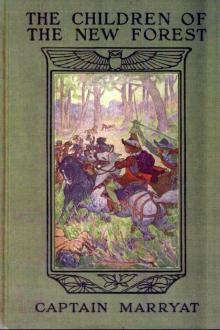 The Children of the New Forest
The Children of the New Forest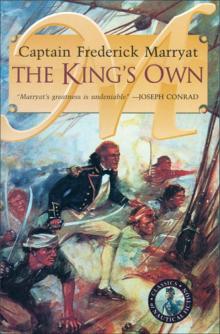 The King's Own
The King's Own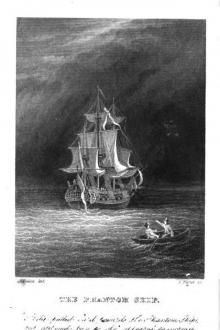 The Phantom Ship
The Phantom Ship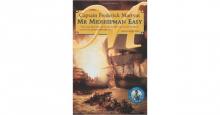 Mr. Midshipman Easy
Mr. Midshipman Easy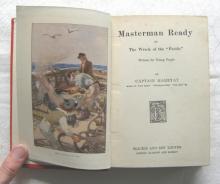 Masterman Ready; Or, The Wreck of the Pacific
Masterman Ready; Or, The Wreck of the Pacific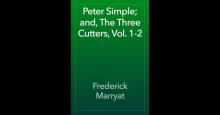 Peter Simple; and, The Three Cutters, Vol. 1-2
Peter Simple; and, The Three Cutters, Vol. 1-2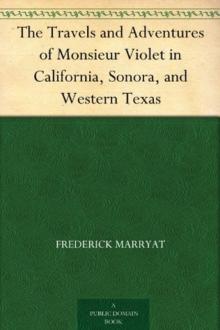 Travels and Adventures of Monsieur Violet
Travels and Adventures of Monsieur Violet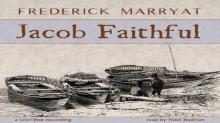 Jacob Faithful
Jacob Faithful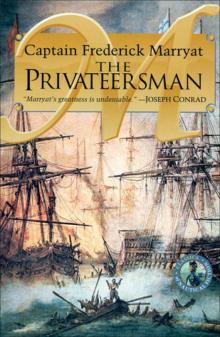 The Privateersman
The Privateersman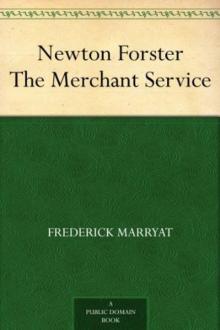 Newton Forster
Newton Forster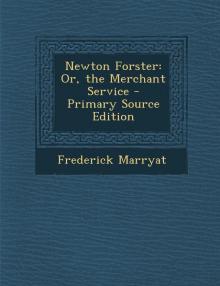 Newton Forster; Or, The Merchant Service
Newton Forster; Or, The Merchant Service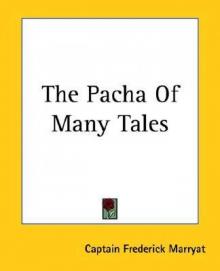 The Pacha of Many Tales
The Pacha of Many Tales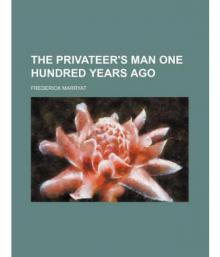 The Privateer's-Man, One hundred Years Ago
The Privateer's-Man, One hundred Years Ago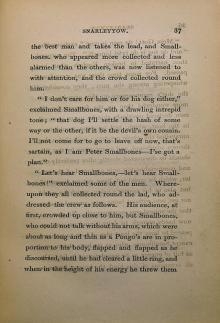 Snarleyyow, or, the Dog Fiend
Snarleyyow, or, the Dog Fiend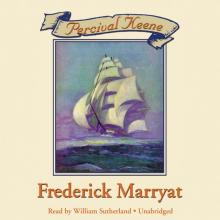 Percival Keene
Percival Keene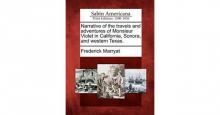 The Travels and Adventures of Monsieur Violet in California, Sonora, and Western Texas
The Travels and Adventures of Monsieur Violet in California, Sonora, and Western Texas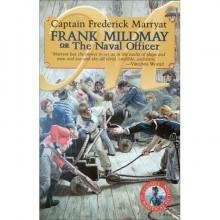 Frank Mildmay; Or, the Naval Officer
Frank Mildmay; Or, the Naval Officer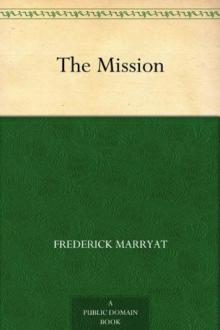 The Mission
The Mission